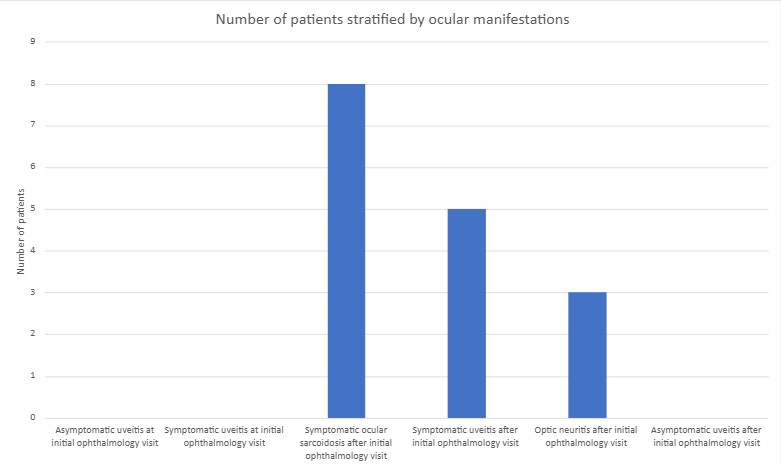Session Information
Date: Sunday, October 26, 2025
Title: (0233–0279) Miscellaneous Rheumatic & Inflammatory Diseases Poster I
Session Type: Poster Session A
Session Time: 10:30AM-12:30PM
Background/Purpose: Asymptomatic ocular involvement must be considered in any patient with sarcoidosis. If left untreated, severe complications, including vision loss, can occur. As a result, sarcoidosis patients without ocular symptoms are frequently referred to ophthalmology for uveitis screening. However, the frequency of these patients being diagnosed with asymptomatic uveitis remains uncertain. Additional referrals may burden the healthcare system, leading to longer wait times. In this retrospective, descriptive analysis, our primary objective was to determine how many patients with non-ocular sarcoidosis developed asymptomatic uveitis after their new-patient sarcoidosis visit. Secondary objectives included determining the number of referrals made to ophthalmology, the number of patients following ophthalmology or optometry, and the number of patients who developed any ocular manifestations of sarcoidosis over time.
Methods: Using our institution’s Data Repository of Pulmonary Sarcoidosis (DROP Sarcoidosis) database, we filtered 2,387 sarcoidosis patients for those with ocular involvement, resulting in 998 patients. This list was further filtered to exclude patients with new patient visit notes mentioning ocular disease not reflected in the database, patients with optic neuritis, and those who eventually received a diagnosis other than sarcoidosis. We then reviewed new and follow-up patient visits occurring from Oct 10, 2019, until November 8, 2024. We searched key phrases in the electronic medical record to determine if patients had a history of ocular involvement and manually reviewed our institution’s internal ophthalmology records.
Results: Our study consisted of 856 patients, with an average age of 53.3 ± 12.6 years. Among our patients, 57.9% were female and 42.1% male, with demographics of 49.1% black, 47.5% white, 0.2% Hispanic, 0.2% Asian, and 2.9% other races. Over an average of 34 months, no patients had asymptomatic uveitis on referral to ophthalmology. However, 8 of the 856 (0.9%) patients developed symptomatic manifestations of ocular sarcoidosis. This included 5 patients developing symptomatic uveitis and 3 patients developing optic neuritis. Additionally, 158 (18.5%) patients were referred internally to ophthalmology. Meanwhile, 419 (48.9%) patients were already following either internal ophthalmology or eye care (ophthalmology or optometry) externally.
Conclusion: Our analysis challenges the necessity of ophthalmology referral for primary screening of uveitis in newly diagnosed sarcoidosis patients. However, some patients subsequently developed ocular manifestations, which may support an indication for new patient referrals when symptoms occur. Patients who are established with ophthalmology may benefit from timely evaluation when ocular symptoms do arise.
To cite this abstract in AMA style:
Nguyen J, Bucur P, Patel S, Syed A, Iden T, McLaughlin J, Gupta N, Kron J, Gwathmey K, Canissario R, Patel V, Syed H. Ophthalmology Screening for Asymptomatic Uveitis in Sarcoidosis Patients: A Single-Center Investigation [abstract]. Arthritis Rheumatol. 2025; 77 (suppl 9). https://acrabstracts.org/abstract/ophthalmology-screening-for-asymptomatic-uveitis-in-sarcoidosis-patients-a-single-center-investigation/. Accessed .« Back to ACR Convergence 2025
ACR Meeting Abstracts - https://acrabstracts.org/abstract/ophthalmology-screening-for-asymptomatic-uveitis-in-sarcoidosis-patients-a-single-center-investigation/


.jpg)